Scott Adams, American cartoonist and commenter on events with a particular view to persuasion and narrative dominance seems to agree. Transcript of key comments:
I think I’ve been telling you for some time the obvious way that these protests/riots/looting episodes were going to go. There was only one way that these would go under the assumption that the police would not get more aggressive and that the local government would not let the federal government come in and take care of the violent stuff. There was going to be no adult supervision and that was intentional. The local leadership decided to not have any adult leadership during the protests/riots/looting. So it was obvious that the locals would end up arming themselves because what else would happen? Could you think of any other outcome? It was obvious this would be the outcome. And this is just the beginning, not just a one-off. It’s pretty obvious that more militia or more citizens are going to bring heavier arms…and they’re going to start showing up…. There’s probably no way it’s going to stop.
The worst case scenario is if the protesters [–> further?] arm themselves…ultimately this is the way it had to go. I feel bad for anyone who gets hurt and I don’t encourage any violence but as a prediction this was the way it had to go. It will end, but with more of this.
Sobering, and familiar.
Regulars at UD will know that I have long been very concerned about a kinetic escalation/spiral in an ongoing 4th generation culture revolution style, Red Guards driven civil war in the USA, geostrategic centre of gravity of our civilisation. Events over the past few days in Wisconsin (U/D: additional, here also see background here with here, here & here, contrasting what is not seen here) underscore that concern, to the level of juggernaut– out- of- control. (The first just linked seems to be at least a good point of reference for thought on a very regrettable but all too predictable event; the second gives background on the metaphor.)
Let me hark back for a moment to my 2016 global geostrategic framework shared here at UD (after public presentations here in the Caribbean):

That is deep backdrop, as we ponder where our civilisation is in the case of the lynch-pin state, the USA.
What happens to the US over the next six to eighteen months is fraught with global consequences that the general populace is at best dimly aware of; but, bet your last cent that movers and shakers behind the scenes have these considerations (from whatever perspective) in mind.
Now, too, for twenty years, I have often used a representation of sustainability-oriented strategic decision-making tracing to/adapted from the Bariloche Foundation of Argentina, set in the context of Environment Scanning and SWOT analysis:
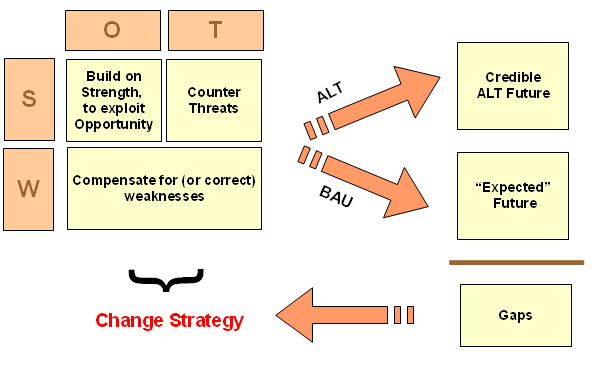
(This is of course precisely the decision theory model which has led me to point to a serious ethics-epistemology breakdown in managing the ongoing COVID-19 pandemic and how treatments are evaluated.)
Further to such, there is a more stringent version, in effect the challenge of the juggernaut i/l/o Machiavelli’s hectic fever model of political disorders:
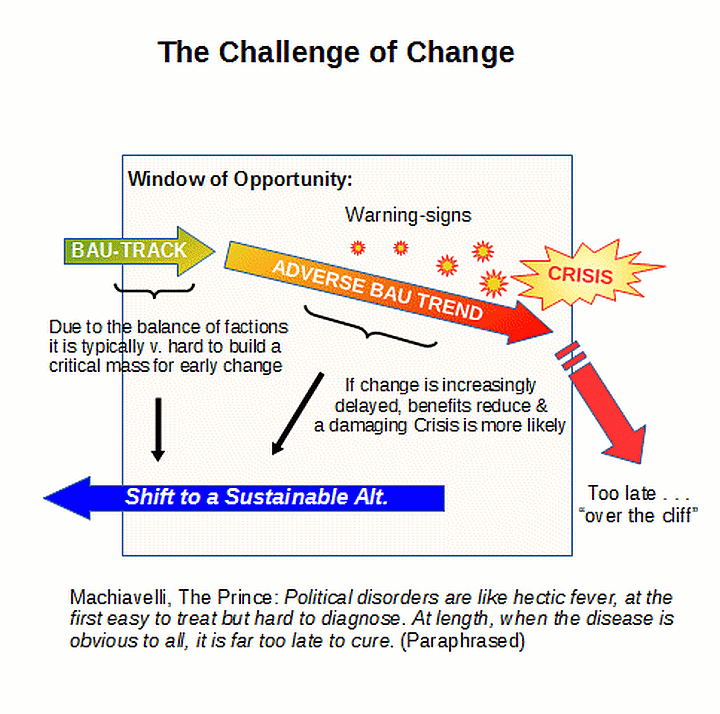
Warning-signs, there have been in abundance, complete with many blood-dripping lessons of history. However, in a deeply polarised polity, building critical mass . . . “consensus” is implausible and half-measure compromises will predictably be built-to-fail . . . in good time to avert going over the cliff is hard, hard, hard. Such, is the nature of problematiques.
Perhaps, the problem can be recast instructively in terms of the dilemmas implicit in the Overton Window:

What happens when the acceptable limit imposed by dominant factions and their narratives locks out good solutions? What would shift the window?
The answer comes back, pain; pain and shattering from going over the cliff.
Or, if we are lucky, enough see the signs in time to act as a critical mass towards sound change before the cliff-edge collapses underfoot.
History, however, is not on the side of prudent foresight, and the history of radical revolutions has been particularly bloody and predictably futile. Never mind the pipe dreams sold by tenured profs and promoted by pundits and community organisers. As just a warning, let us compare a fools-cap image from the 1966 Mao-backed Red Guards:

. . . and a notorious recent incident in Washington DC:

. . . not forgetting the tragedy of the man who refused to salute in 1930’s in a Germany ruled by the National Socialist German Worker’s Party (and yes, contrary to the dominant narrative, they meant the “Socialist” part and the “Worker’s” part):

We need to pause and think again, I am somehow unable to take it for granted that we cannot turn back, even at the brink. Maybe, I am being irrationally hopeful for reprieve; but, let us at least ponder a case from an often overlooked classical report:
Ac 19:23 . . . [c. AD 57] there arose no little disturbance [in Ephesus] concerning the Way.
24 For a man named Demetrius, a silversmith, who made silver shrines of Artemis, brought no little business to the craftsmen.
25 These he gathered together, with the workmen in similar trades, and said [–> behind the scenes manipulative plotting], “Men, you know that from this business we have our wealth. 26 And you see and hear that not only in Ephesus but in almost all of Asia this Paul has persuaded and turned away a great many people, saying that gods made with hands are not gods. 27 And there is danger not only that this trade of ours may come into disrepute but also that the temple of the great goddess Artemis may be counted as nothing, and that she may even be deposed from her magnificence, she whom all Asia and the world worship.”
28 When they heard this they were enraged and were crying out, “Great is Artemis of the Ephesians!”
29 So the city was filled with the confusion, and they rushed together into the theater, dragging with them Gaius and Aristarchus, Macedonians who were Paul’s companions in travel. 30 But when Paul wished to go in among the crowd, the disciples would not let him. 31 And even some of the Asiarchs,5 who were friends of his [–> they had charge of the very Temple in question; obviously, Paul’s lectures in the Hall of Tyrannos and his reaching out to people had won him respect and even friendship], sent to him and were urging him not to venture into the theater.
32 Now [in the unlawful assembly] some cried out one thing, some another, for the assembly was in confusion, and most of them did not know why they had come together. 33 Some of the crowd prompted Alexander, whom the Jews had put forward. And Alexander, motioning with his hand, wanted to make a defense to the crowd.
34 But when they recognized that he was a Jew, for about two hours they all cried out with one voice, “Great is Artemis of the Ephesians!”
35 And when the town clerk had quieted the crowd ] –> doubtless, sent by the Asiarchs], he said, “Men of Ephesus, who is there who does not know that the city of the Ephesians is temple keeper of the great Artemis, and of the sacred stone that fell from the sky?6 [–> apparently a meteoritic object turned into an idol] 36 Seeing then that these things cannot be denied, you ought to be quiet and do nothing rash. 37 For you have brought these men here who are neither sacrilegious nor blasphemers of our goddess. 38 If therefore Demetrius and the craftsmen with him have a complaint against anyone, the courts are open, and there are proconsuls. Let them bring charges against one another. 39 But if you seek anything further,7 it shall be settled in the regular assembly. 40 For we really are in danger of being charged with rioting today, since there is no cause that we can give to justify this commotion.” [–> in effect he hinted of the regiment doubtless camped not too far away; cf. the Nika riots under Justinian]
41 And when he had said these things, he dismissed the assembly. [ESV]
How easily, the democratic impulse deteriorates into the raging, out of control, manipulated, riotous, destructive mob!
And if there was no excuse for rioting under a lawful oligarchy (what the C1 Roman Empire had become, after failure of the Republic through envy, selfish ambition, assassination and civil wars leading to the rise of Octavian as Augustus), how much more so, is it inexcusable in any reasonably functional modern constitutional democracy?
I give a bit of context:
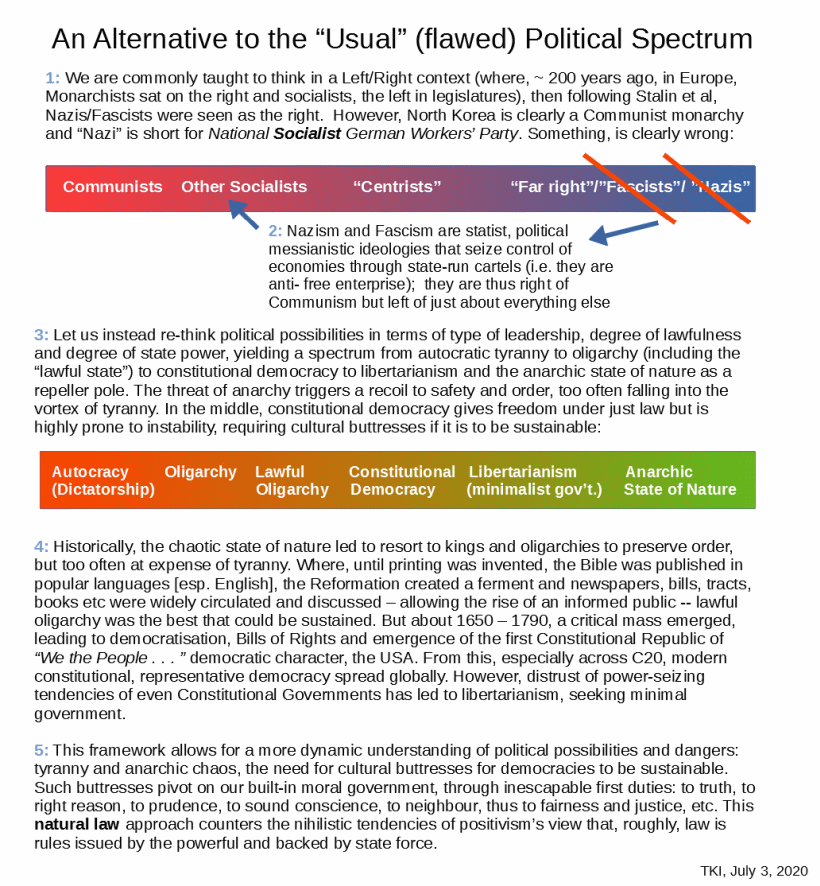
U/D: context:

Further U/D, Sep 5, context of the seven mountains model for mapping society/culture/ civilisation and its main pillars of influence:
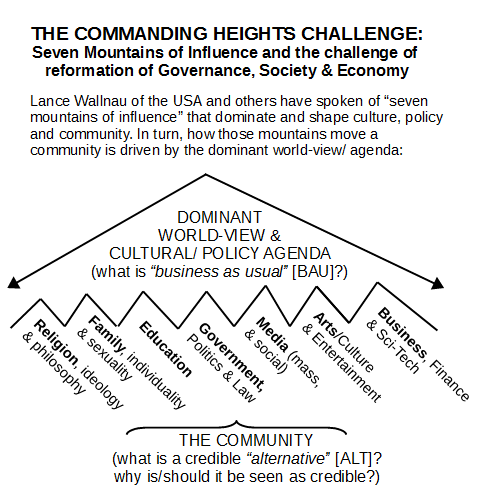
Governance is visibly failing, some think the mob will be appeased (it cannot), we are at cliff’s edge, with alarming cracks.
Can’t we stop before we go over the cliff?
Please . . . ? END
F/N, Sept 4: FTR, here is a clip of the actual transcript in the context of an incident where Mr Trump is routinely and falsely said to have endorsed Neo-Nazis etc as fine people:

It is obvious that this is precisely the sort of condemnation of neo-nazis that it is suggested Mr Trump has failed to give. That such tainting misrepresentation continues to be routinely promoted speaks volumes on disregard for truth and fairness. Notice, too, how he anticipated the progression from attacking statues of confederate leaders to American founders, with the obvious extension that cancel culture has no limits.
F/N2: Anatomy of a Red Guards Brigadista hit team/swarm in action, Portland USA:

(I add, Sep 6, while the above photo is already demonstrative of a coordinated murderous ambush, there is a video analysis here, UD can only embed YT. This event likely shows that both major front groups involved in the Red Guards brigadista insurgency are joined at the hip. For instance, the shooter had a BLM fist tattoo on his neck and declared himself 100% Antifa. His later suicide by shootout likely shows commitment to not be taken alive, i.e. he had knowledge of key information he judged worth guarding at the cost of his life. Modern interrogation techniques will credibly eventually “break” anyone.)
Let’s clip:
Portland Police are seeking help to identify a possible accomplice pictured here in the Portland Patriot Prayer member shooting. Here is a picture of the moments before the shooting. Notice the shooter is beginning to move as he draws his weapon, even though he does not have a sightline to the targets yet, and his position behind that cover would seem to be far enough back he could not otherwise have known his targets were hitting that position at exactly that moment. How did he know his targets were about to enter the killzone right then, and he needed to draw and begin moving? Even more interesting, in the criminal complaint on page 17, it points out he was initially walking with a woman in a white T-shirt, coming from one direction to that corner, and both were staring down the street at the targets who were a ways away, coming from a completely different place, as if the shooter and his partner had been told over the air to go there, and the targets they were about to shoot were coming from that direction, and they were identifying them. Once they got a bead on the targets, the woman stopped at the corner and loitered as he continued on and took cover in that alcove. Taking a corner gave her sightlines up and down all streets there, which would be second nature to the trained surveillance operative. And yet not having a sightline to the shooter, how would she communicate with him? They were linked by radio. Look up behind the targets in the picture above, and you will see a lone guy who looks like the guy they are looking for. Notice his hand is covering his mouth just as the shooter begins to move, and the shooter is not holding a walkie talkie to receive any broadcast. It looks an awful like the guy behind the targets had taken surveillance command of the targets, he was trained enough that casually covering his lower face as he whispered into his chest was second nature, and he was radioing to the shooter who had an earpiece to receive, and probably a chest mic to transmit, triggering his movement at that moment, coordinating it to the targets. Also interesting, this new character may be surveillance aware enough he turned away from the surveillance camera as he came into view of it.
It takes a lot of time, recruitment effort, ideological motivation/desensitisation to morality, tactical training by experienced experts and rehearsal to run a complex hit like this. (For sure, this is no hothead running up to someone they hate and shooting in a rage, the surveillance cam shot demonstrates an orchestrated hit of the type used by Intel agency wet work teams or sophisticated terrorists. “mostly peaceful” and “protest” are off the table.)
That has to have a significant, years-long logistics trail, with face to face and communications networking, yielding traffic patterns.
So, this one case may be a break into what is now clearly a terrorist network.
Take it as a yardstick indicating the extent and depth of what is going on, a full-orbed 4th generation war insurgency backed by years of organisation and serious logistics, with carefully laid plans and organisation.
F/N3: And yes, “NAZI” lives don’t matter:
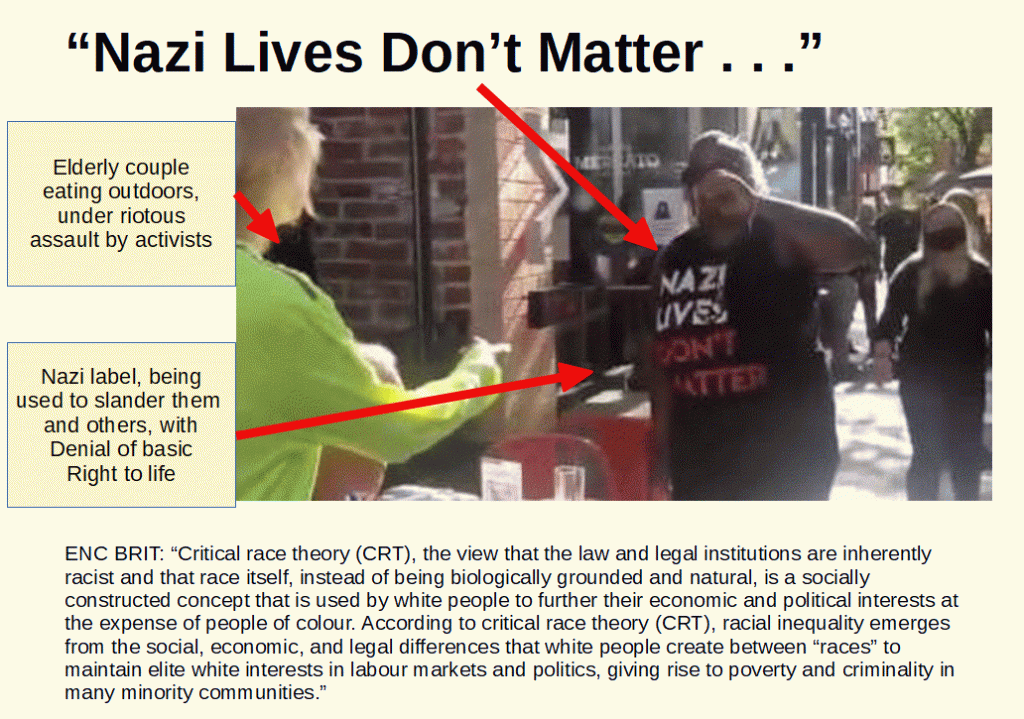
Clear intent to slander, brand and rob of right to life. Instead, we must recognise that life is the first right, without which there are no other rights. Therefore, we start with mutual respect and go on from there.
F/N4: U-Haul a Riot, Sept 2020
